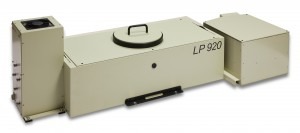
Researchers at Duke University have utilised the LP920 laser flash photolysis spectrometer to observe excited triplet states of single-wall carbon nanotubes (SWNTs) for the first time
The research provides new insights into the fundamental photophysical processes of 1-dimensional carbon-based nanostructures.
SWNTs facilitate ballistic charge transport and fast singlet exciton migration over long distances; such properties are highly useful for electronic and photonic devices.
Nanosecond pump-probe transient absorption experiments of purified SWNTs were carried out using the LP920 laser flash photolysis spectrometer equipped with the L900 software for control and data acquisition.
A previously unidentified transient absorption band at 1150 nm was shown to correspond to a SWNT T1 to Tn transition; the lifetime of the SWNT triplet excited state was found to be 17.4 and 6.5 us, respectively, in D2O and DMSO solvents.

